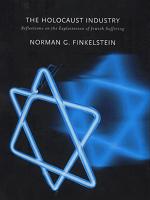
The Holocaust Industry
Norman Finkelstein
160 pages
published in 2000
Norman Finkelstein's The Holocaust Industry is an attempt to expose the way in which the historical nazi holocaust, in which some six million Jewish people died as well as several million other victims, has been transformed into the Holocaust, the unique suffering of the Jewish people and ultimate justification for any Israeli action, no matter how vile. According to Finkelstein, this transformation occurred in the context of a changing US policy towards Israel after 1967, when the US largely switched support from the Arab states towards Israel, which had proven itself to be the most powerful nation in the Middle East.
Before that, Finkelstein argues, American Jews were more concerned about integrating into US society, which had little patience for or interest in the Holocaust. Finkelstein further argues that before 1967, Zionist organisations were loath to emphasise the Holocaust too mcuh, for fear that this would encourage the US and other western countries to open their borders for more Jewish refugees from Central Europea, which would both diminish Jewish emigration towards Israel, supposed to be the only true Jewish refuge and might rekindle latent anti-semitism in the US and elsewhere, a fear that was not entirely unjustified.
It was because Israel proved itself to be useful to the US that the latter's Middle East policy changed into one of largely unqualified support for Israel. But while the 1967 war proved Israel to be the top military power in the Middle East, propaganda started portraying Israel as a victim of Arab agressiveness, and that agression as a continuation of the nazi Holocaust: what Hitler failed to do, the Arabs were attempting to finish. In this way, the Holocaust could both be used as justification and as cover for any crimes Israel was committing against the Palestinians on whose land it was founded, as well as against its neighbouring countries. This inevitably led to a politicisation of the Holocaust, a politicisation that emphasised the Jewish character of the Holocaust, ignoring or even denying that the Holocaust made other victims as well. The Holocaust became not just a symbol of "man's inhumanity towards man", but of "man's inhumanity towards Jews", with Jews becoming the eternal victims, not able to trust anybody but themselves.
To achieve all this, Finkelstein argues, an entire industry came into being. Whereas before the Holocaust was the reserve of academic study, after 1967 it went mass media. Holocaust became big business, with a veritable flood of Holocaust books, films, musea and awareness programs, few of which contribute anything to our understanding of the Holocaust, according to Finkelstein.
What is worse is the way in which Holocaust compensation claims have become big business as well, with organisations like the World Jewish Congress blackmailing countries like Switzerland and Poland into paying grotesque compensation claims. Furthermore, this money, instead of going directly to those Holocaust survivors still alive to alleviate their suffering, is going to various Jewish organisations involved in the Holocaust industry as well as being used for more Holocaust awareness. In the process the real victims are often forgotten, so says Finkelstein, whose parents both lived throught the Warsaw ghetto and the nazi concentration camps.
According to Finkelstein then, there are several Jewish organisations involved in enforcing legally dubious claims of compensation which are largely used to fill their own coffers, while at the same time the Holocaust is used as a club to still any protest of Israel's actions and justified American support of Israel. That all this is likely to increase anti-semitism is of little concern, so it seems; in fact a resurge of anti-semitism in Europe or elsewhere just strengthens the Zionist claims of Israel being the Jews' only hope...
The Holocaust Industry is not a scholarly study, more of a deep felt polemic. This does not necessarily make the accusations Finkelstein raises any less true however. Finkelstein builds his case with cold precision, even when his language is heated. He is angry about this exploitation of the Holocaust, but he has right to be angry; he is after all the son of two Holocaust survivors himself.
